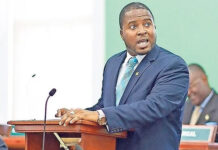By Vivian Tyson – SUN Senior Editor
Turks & Caicos — There is increasing fear that sick persons who are referred to hospitals in The Bahamas from the TCI could end up sustaining further injuries and even die for lack of proper attention as a result of communication breakdown between the referral system here and their Bahamian counterparts, resulting in a call for full review of the system.
But Director for Health Service, Dr. Rufus Ewing is claiming that such allegation is unfounded, saying that even if there is a breakdown in communication when the patients arrive in The Bahamas, such failings, for the most part, did not originate in the Turks and Caicos Islands.
The SUN was informed that patients who were sent to Nassau did not receive prompt treatment since medical officials there complained that the necessary preparations were not made for their arrival, and that the delays in medical intervention mitigated their effective treatment.
This information was relayed to His Excellency Governor Gordon Wetherell and Chief Executive Officer for the Civil Service, Mark Capes, during a meeting with pastors in Grand Turk on March 11.
But in an interview with The SUN, the Health Services Head said the problem could very well stem from The Bahamas end. According to him, patients are predominantly sent to the Princess Margaret Hospital in Nassau, which he said at times can be very chaotic, and as a result, information sent to them could have gotten lost in transit.
“There are many reasons that there could be delays. It is generally known that if people are not prepared properly in terms of both sides calling to inform of a patient’s coming, yes, it can result in delay. It all depends on the facility at times.
“Most times when we experienced delay of that sort it would be usually at the Princess Margaret Hospital. We have never had that kind of situation at Doctors Hospital. The Princess Margaret Hospital is a government hospital, so usually at times it is quite chaotic because they are quite busy,” Dr. Ewing said.
Explaining what may have happened which led the breakdown, Dr. Ewing noted, that at times the miscommunication could occur between an officer departing duty and another taking up his slot.
He noted that at times the officer leaving duty would receive the information during his working hours, but before clocking out, does not turn over the information to his successor, who when confronted with the arrival of the patient, is unaware of such record, resulting in, at times, lengthy process of registration.
“Even though that (allegation of delays) might be true, the information may be communicated from here to officers on duty (in The Bahamas), but by the time the patient reached, there is another officer on duty, and that officer who the call was made to, did not turn over the patient properly before leaving, and that could result in the chaos,” Dr. Ewing explained.
However, he noted that such cases would be the exception rather than the rule, even though the TCI Government is working to ensure that there is seamless transfer of information between here and The Bahamas, so that patients don’t experience long delays before being seen by a doctor.
Posted April 6th 2010







